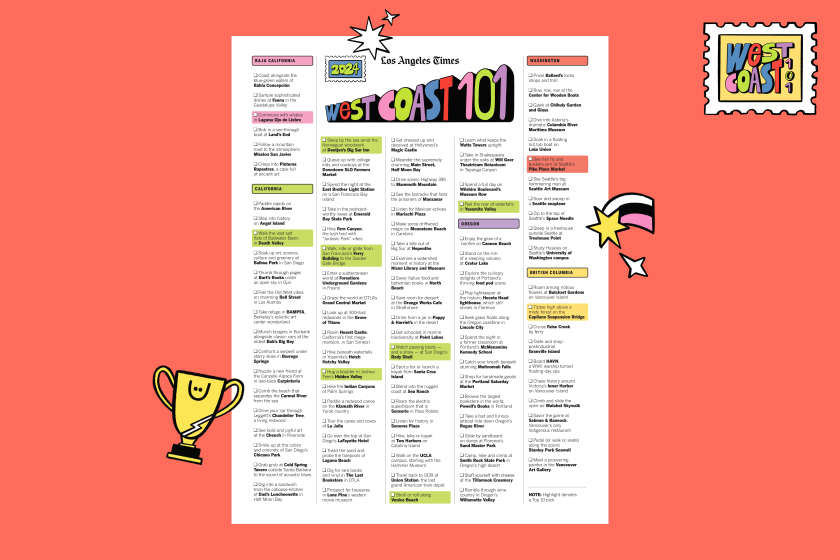El Mariachi : The Hours Can Be Long and Late, the Work Hard to Find, but Tradition Compels the Strolling Minstrels to Continue Practicing Their Unique Door-to-Door Artistry.
Music has been Jose Jesus Vargas’ muse since he was a boy. As a teen-ager, the Jalisco, Mexico, native learned to play mariachi and that soon became his passion. When he moved to the United States in 1966--eventually settling in Maywood, where he and his wife raised a family of three--he brought that love and his instruments with him.
Nightly for 10 years, Vargas has waited at 1st Street and Boyle Avenue in Boyle Heights for the chance to serenade for hire. Borrowing a ritual from Mexico City’s famed Plaza Garibaldi, mariachis have gathered there for 50 years. When business is slow, they stroll the old neighborhood, stepping into restaurants and cantinas to play for tips.
Those tips don’t add up to much. But for “musicos” like Vargas, being a mariachi is more than a job--it’s keeping a tradition alive. Last month, the city approved a plan that will designate a stretch of sidewalk at 1st and Boyle as Mariachi Plaza, giving musicians like Vargas, 56, a sense of legitimacy and approval. Vargas was interviewed by Staff Writer Kevin Baxter.
*
Here the city has treated us well. The city has given us a facility for our work.
Wherever you go, the musicos know about this plaza. Musicos come here from Texas, from Mexico or wherever because they know this plaza exists for the musicos to meet. For us, it’s a great thing to have a place to meet.
I can say that there are musicos looking for work in every area of Los Angeles because there are a lot of musicos here. But this place has a long history and it is here that people meet to make up their groups. It’s a tradition.
The thing we offer is, artistically we present in different ways the music and folklore of Mexico.
I started to play when I was very small, but I didn’t start playing mariachi until I was about 18. I played in the same little town, Chapala.
I’ve been the leader of my group for a long time but I don’t like to be the boss. I like my work but I feel like the real one in charge of us is the boss who pays us for the songs we play.
Our job is not like painting or hammering a nail. Our thing is an art and it has to be well-paid. However, here they don’t appreciate that and they pay us very little. Usually we ask for $5 a song. What I really want to charge is $10, but no one is going to pay that.
We earn $100 for the weekend. Sometimes we earn $200. But it’s not something stable, our job. It would be good if there was something more secure.
We have a group of six people. You really can’t have any more than six because then when you divide up the money, there won’t be enough to make it worthwhile.
The rule we have here is we are supposed to wear uniforms, more or less similar uniforms. We are to be here certain hours and work hard. Everything is work. If we don’t work hard, no one is going to pay us to play.
We have to practice and understand the melodies that the people want us to play.
I know how to do other things. I’m a painter. And, above all, I can also work in the fields. But I like this work because, in reality, at my age, they’re not going to give me much work elsewhere.
Some people who live around here don’t like us. Sometimes a lot of the people, the ones they call cholos and people like them, they come rob us, assault us and carry on. They tried to rob me one night but I didn’t let them. I fought them off. They wanted to take the money I had to bring home to my family.
But not everyone can fight them off. I think that the government should arrest all these people. These people need to be taught a lesson or put in a place where they can be watched all the time. Put them to work so that they can’t cause trouble.
I like the protection that we have now from the city. They treat us like productive people, not like parasites. Our labor is to come to work, and what we earn stays here in the city. I give thanks that they realize that we’re artists.
Most of the work we get is by phone; people call us and ask us to play. When we have no calls, we go out to the plaza at around 5 in the afternoon and we’ll be out until 1:30 or 2 in the morning waiting for someone to ask us to play or playing in the bars and restaurants.
Sometimes we do poorly during the week because of the high unemployment; there’s no one in the bars who can afford to pay us. Sometimes we’ll go to two or three bars and we get nothing. In six hours, we might make between $12 and $15.
In the mornings, I work with the Mexican-American Opportunity Foundation. That’s a group for older people; there’s no one younger than 55. I go there and practice my violin and the foundation sends me to hospitals and schools to play for people.
I still support five people--my kids and my wife. My son learned to play music, but he didn’t like it that much. He didn’t like to practice. My daughters I taught to play guitar. They’re in a church choir.
I play violin right now. Before, I played the trumpet more than 20 years. And, well, I know how to play different instrumentos. It’s important to know how to play a lot of different instruments.
I haven’t really thought about how long I’m going to continue doing this. But I do want to go back to Mexico because in Mexico I can make more money.
Sign up for The Wild
We’ll help you find the best places to hike, bike and run, as well as the perfect silent spots for meditation and yoga.
You may occasionally receive promotional content from the Los Angeles Times.



